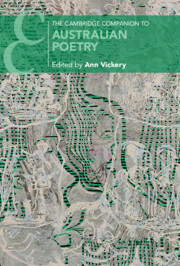Book contents
- The Cambridge Companion to Australian Poetry
- The Cambridge Companion to Australian Poetry
- Copyright page
- Contents
- Figures
- Contributors
- Acknowledgements
- Chronology
- Introduction
- Part I Change and Renewal
- Part II Networks
- 4 Above and Below
- 5 Romanticism, Sensibility, and Settler Women Poets
- 6 Experiment and Adaptation
- 7 The Post-war Golden Generation, 1945–1965
- 8 Generation of ’68 and a Culture of Revolution
- Part III Authors
- Part IV Embodied Poetics
- Part V Expanding Form
- Further Reading
- Index
- Cambridge Companions To …
- References
6 - Experiment and Adaptation
Modernist Poetry in Australia
from Part II - Networks
Published online by Cambridge University Press: 06 June 2024
- The Cambridge Companion to Australian Poetry
- The Cambridge Companion to Australian Poetry
- Copyright page
- Contents
- Figures
- Contributors
- Acknowledgements
- Chronology
- Introduction
- Part I Change and Renewal
- Part II Networks
- 4 Above and Below
- 5 Romanticism, Sensibility, and Settler Women Poets
- 6 Experiment and Adaptation
- 7 The Post-war Golden Generation, 1945–1965
- 8 Generation of ’68 and a Culture of Revolution
- Part III Authors
- Part IV Embodied Poetics
- Part V Expanding Form
- Further Reading
- Index
- Cambridge Companions To …
- References
Summary
This chapter outlines how Christopher Brennan ushered in an experimental strand of Australian poetry through his engagement with French Symbolism, which was followed by John Shaw Nielson’s celebration of intuition and the more-than-human. It considers Nietzschean vitalism in Kenneth Slessor’s representation of urban Sydney and analyses the beauty and nihilism of his “Five Bells.” The chapter also argues that Lesbia Harford’s poetry was modernist in its radical openness about female sexuality and the female body, its minimalist representation of the working life of modern women, and lack of Romantic assumptions in her treatment of the natural world. It further considers the rhetorical force and frankness of queer desire in the work of Anna Wickham, before addressing the hoax poet Ern Malley.
- Type
- Chapter
- Information
- The Cambridge Companion to Australian Poetry , pp. 101 - 118Publisher: Cambridge University PressPrint publication year: 2024

